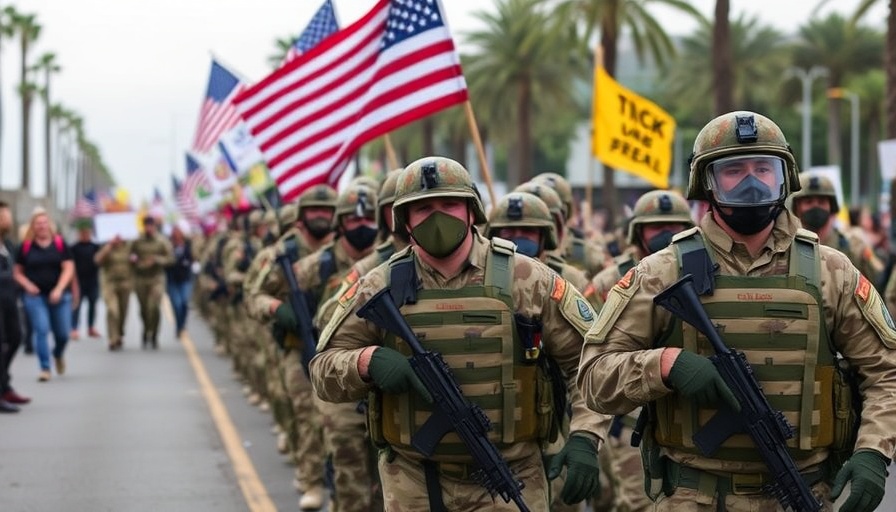
Trump's Response to Military Support and Protests
In a significant move, President Donald Trump has ordered the deployment of approximately 700 Marines to Los Angeles, a city grappling with widespread protests against stringent immigration policies. This decision comes amid a backdrop of escalating tensions, as demonstrators gather outside a federal detention center where immigrants are held. Over the last few days, protests have intensified, marking a critical juncture in discussions surrounding immigration reform and state vs. federal powers.
Understanding the Context: Immigration Policies Under Fire
The backdrop of these protests lies in Trump's aggressive immigration policies which many argue violate human rights and state sovereignty. Activists contend that the deployment of military forces, particularly while protests are ongoing, represents an alarming overreach of federal authority. In fact, the state of California has initiated a lawsuit aimed at blocking the deployment of National Guard and Marines, asserting that it conflicts with both federal law and the rights of its citizens. This legal challenge highlights the growing rift between state governments and the federal administration, particularly on issues of immigration and law enforcement.
The Scene of Demonstrations and Government Response
As protests entered their fourth consecutive day in downtown Los Angeles, the streets witnessed fervent chants and calls for change. Protesters gathered, shouting slogans such as "Pigs go home!" at National Guardsmen, emphasizing their frustration and anger towards federal actions perceived as oppressive. In a controversial show of force, police employed flashbangs and rubber bullets to clear protesting crowds—measures that have provoked further outrage among demonstrators, sparking discussions on civil liberties and police power.
Public Sentiment: Support and Opposition
This volatile situation not only illustrates the conflict over immigration but also reveals the deep divide in public opinion regarding military involvement in civilian protests. While some citizens view the deployment of Marines as a necessary measure to maintain order and protect federal property, others perceive it as a militarization of civil unrest that could lead to more significant confrontations and loss of life. Notably, movements advocating for immigrants’ rights are tapping into social media channels to amplify their message, urging communes to stand with marginalized voices in their fight against injustice.
Future Implications: Where Do We Go From Here?
The ramifications of this military deployment could set a precedent for how the federal government addresses similar protests in the future. If successful, it may embolden federal authorities to use military forces against civilian demonstrations downtown or in other states, potentially altering the dynamics of civil rights movements across the nation. Moreover, with a legal battle brewing in the courts, the outcomes of California's lawsuit could redefine the powers vested in state and federal governments when addressing immigration policies and the protection of its citizens’ rights.
Conclusion: An Ongoing Conversation on Rights and Governance
As Los Angeles continues to face protests amid increasing military presence, an essential debate reverberates throughout the nation: the balance between maintaining order and safeguarding civil rights. The intersection of immigration policy, military deployment, and citizen dissent presents a complex tapestry of issues that require ongoing public discourse. Engaging in these conversations helps reinforce the democratic process, providing a platform for diverse opinions while addressing fundamental concerns over human rights and governmental authority.
 Add Row
Add Row  Add
Add 




Write A Comment